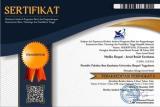GAMBARAN PENGETAHUAN IBU HAMIL TENTANG KEKURANGAN ENERGI KRONIS DI WILAYAH KERJA PUSKESMAS BANJAR 1 KOTA BANJAR
DOI:
https://doi.org/10.35842/mr.v15i2.245Keywords:
Knowledge, chronic energyAbstract
Background Pregnant women who suffer from chronic energy have a sudden maternal death risk during pregnancy or risk of giving birth to newborn baby (LBW). In these circumstances many mothers die of bleeding, thase increasing the maternal and child mortality. There are 3 indirect causes causing less nutrition, namely: Inadequate family food security, inadequate childcare patterns, and inadequate health and environmental services are health care systems. These three factors are related to the level of education, knowledge and family skills. The higher the level of education, knowledge and skills, the better the level of family food security.
Objective The purpose of this study is to know the description of knowledge of pregnant women about Chronic Energy Lack (KEK) in the work area of Banjar I Health Center Banjar.
Methods: The type of this research is descriptive research. The population is all pregnant women in the work area of Banjar I Public Health Center Banjar as many as 112 people. Determination of sample with random sampling technique and got 53 pregnant women. Â
Results The results of the research in Banjar I Banjar I working area showed that the knowledge of pregnant women about the definition of chronic energy deficiecy (KEK) Â included less category that is 30 people (56,6%).
Conclusion: knowledge of pregnant women about the definition of chronic energy deficiecy (KEK) Â included less category that is 30 people (56,6%).
References
Arikunto S., 2009. Prosedur Penelitian Suatu Pendekatan Praktek. Edisi Revisi V. Jakarta : Rhineka Cipta.
Astri. (2011). Hubungan Pengetahuan Gizi dengan Kejadian KEK pada Ibu Hamil, http:www.litbangdepkes.com diakses 15 juni 2018.
Arikunto. 2006. Prosedur Penelitian Suatu Pendekatan Praktek. Jakarta : PT. Rineka Cipta.
BPS (2009) Survei Sosial Ekonomi Nasional (Susenas) Tahun 2009, Jakarta:BPS.
Budiman & Riyanto A. 2013. Kapita Selekta Kuisioner Pengetahuan Dan Sikap Dalam Penelitian.
Departemen Kesehatan RI. 2009. Pedoman Pelayanan Antenatal di Tingkat Pelayanan Dasar. Jakarta: Depkes RI.
Departemen Kesehatan RI. 2010. Pedoman Pelayanan Antenatal di Wilayah Kerja Puskesmas. Jakarta: Depkes RI.
Departemen Kesehatan RI. (2011). Profil kesehatan Indonesia 2009.
Depkes RI. 2012. Profil Kesehatan Indonesia. Jakarta: Depkes RI.
Hidayat. 2009. Metode Penelitian Keperawatan dan Tekhnik Analisis Data. Jakarta: Salemba.
Hapzah(2009)pengaruh-konseling-gizi-pada-ibu-hamil-terhadap-status-gizi-janin/.https://rosmini44.wordpress.com/2009/11/11/. Diakses 19 Juni 2018.
Persagi,2012peran-ahli-gizi-dalam-konseling-gizi https://www.kompasiana.com/adityaagustinus/55177f2aa333117607b65e2d/. diakses 28 Juni 2018.
Medika. Karyadi,. 2010. Kecukupan Gizi yang Dianjurkan . Jakarta: PT Gramedia.
Riyanto. 2013. Metodologi Penelitian Kesehatan. Yogyakarta: Nuha Medika.
Kesehatan. Jakarta : Salemba Medika pp 66-69.
Notoatmodjo, Soekidjo.(2012). Metodologi Penelitian Kesehatan. Jakarta: Rineka Cipta.
Notoatmojo, 2010. Metodologi Penelitian Kesehatan. Jakarta: Rineka Cipta.
Notoatmodjo, S. 2011. Kesehatan Masyarakat. Jakarta: Rineka Cipta




